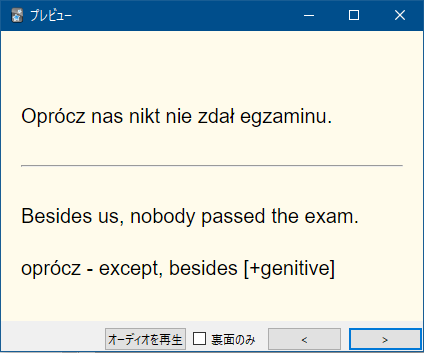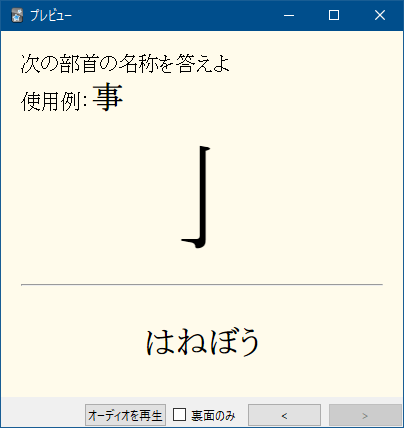This page consists of blog-like journal entries about my current thoughts and experiences regarding language learning.
2024/01/02 - General
It's one thing to have general long term "goals" but by themselves they have little
meaning since it isn't possible to actually do them everyday.
There needs to be a concrete action which can be done.
For example:
A nebulous, generic goal: I want to get in shape this year.
An admirable goal, but what is the concrete action which can be taken? This goal has no direction.
A concrete goal: I want to go for a 20 minute run 4 times a week in the morning.
This goal is well defined and has a concrete action which can be done,
and if successfully adhered to for a year, will also achieve the initial, general goal.
In that spirit, I would like to define some concrete goals when it comes to Japanese and Polish,
which can be executed every day. It's already a given I want to improve, but "I want to improve" is not a sufficient goal.
Japanese/Kanken
- Make at least 3 radical cards per day, until all are learned.
- Make at least 5 recognition and production kanji cards per day.
- Make at least 3 sentence cards per day.
- Read at least 25 book pages per day.
- Get at least 60 minutes of active listening per day.
Daily burden is estimated to be 30 minutes, 30 minutes, 60 minutes, for SRS, reading, and writing, respectively.
A total of 2 hours.
Polish
- Make at least 15 sentence/vocabulary cards per day.
- Get at least 15 minutes of reading per day.
- Get at least 45 minutes of active listening per day.
Daily burden is estimated to be 30 minutes, 15 minutes, 45 minutes, for SRS, reading, and writing, respectively.
A total of 1.5 hours.
However, they are not set in stone, so if I feel that some adjustment is needed, either to lower the burden if life circumstances calls for it, or to increase the burden if it seems too easy, I will adjust them accordingly.
With these initial concrete goals set, I'd like to start off the year well. I'll be tracking my adherence to these goals as well, and I'll likely write a monthly recap at the end of January to summarize how it went.
Peace out.
2024/01/01 - General
Happy New Year!
I'm thinking about how I want to approach this blog going forward.
Language learning is slow enough of a process that you won't really see any benefits
from day to day, and in the same sense, I don't think it makes sense to write about it
that frequently.
Though, I definitely want to make this a regular thing, so here is my current plan:
- I want to write one journal entry per calendar month for both Japanese and Polish.
This should be an update about the process, how much progress I've made, improvements, etc. - If there is any change to my method of studying, that will be worthy of its own post.
- If I discover new helpful tools to facilitate the process, that is also worthy of a post.
- If I just feel like writing about something regarding language learning, go for it.
I'm looking forward to a productive year for language learning where I sharpen my Japanese, get ready for the Kanken Level 2 exam, and finally achieve some proficiency with Polish!
2023/12/31 - Polish
For the past 4 months or so, I have been back in learning Polish with immersion and Anki.
This summer (August 2023) I visited my family in Poland, and unfortunately my Polish was not up to
the level it should have been, which severely reduced my ability to communicate at all with my family. 🙁
Long story short, it was quite the demotivating experience, and I do not want to repeat it again when I visit my family
in Poland next year.
I want to be as good as I can be next year, so I went back to the good ol' trusty AJATT/Antimoon method, with immersion and SRS.😎
As of now I am still making bilingual sentence cards, with the Polish sentence on the front and the English translation of unknown words
and meaning of the sentence on the back, but I eventually hope to switch to completely monolingual some time in the near future.
To be completely honest, it has kind of been a challenge to motivate myself to keep up with my Polish studies here in Japan,
but when I think back to how unfortunate my experience in Poland was last summer due to my inability to speak or understand to
any significant level, it usually gives me the kick in the ass I need to stay focused.
I intent to post more updates going forward, but for now, here is just a basic screenshot of one of my bilingual Anki cards.

2023/12/31 - Japanese
I've recently gotten back into "actively" studying Japanese. For all intents and purposes
my Japanese is as fluent is it ever would need to be. After all, I have been doing Japanese
for 13 years at this point, and I live here in Japan working at a Japanese company. My partner
is Japanese and we only communicate in Japanese because she does not speak English.
However, my Japanese is still not perfect. If I am to read a novel, there can still be like 1 unknown
word every 3 pages or so. If it's a 300 page book, that would be 100 unknown words! I don't need to know
them to understand the book anyway, so there is little motivation to actually learn those words. 😅
I have been at this level of comprehension for years now, always satisfied with my current level, because it
is "good enough." Though, if compared to a knife, it would be like a dull knife. It can get the job done, but it's
not as effortless as a razor sharp blade.
I want my Japanese to be that razor sharp blade. So, recently, I've felt some drive to actually get down
to business and finally fill in these lingering holes in my Japanese ability. I will be more proactive with
actively learning unknown words I come across, as opposed to my mentality up until now, where I would just
brush them off because it didn't really affect my comprehension anyway. So back to Anki with Japanese sentences for me! 😃
In addition, I've decided to study for the 日本漢字能力検定 (Kanji Kentei, or Kanken for short) which is an
exam in Japan designed for Japanese people to test their knowledge of Kanji. To be honest, there isn't really a
tangible benefit from getting this certification, but it definitely will look cool on your resume, especially
if you are a foreigner like I am.
I am currently going for Level 2 (2100 kanji), which is the 3rd highest level, out of 12 levels. Once I pass this level, I want
to go for Level Pre-1 (3000 kanji), which is the 2nd highest level. Level 2 is pretty impressive, Level Pre-1 is really impressive.
Level 1, the highest level, however, is so comprehensive (6000 kanji!) that I don't think it is really worth the effort.
In the long term, if I can get Level Pre-1, that would be more than enough to make me happy (and give a tiny amount of bragging rights,
especially when Japanese people ask me if I know Kanji 😉 p.s. I really hate that question.)
I already "know" around 3000 Kanji (in terms of recognition and understanding their meaning), and can reliably write from memory
all the 2100 or so Joyo (common use) Kanji. However, the Kanken exam is a lot more comprehensive than just being able to
simply read and write the characters, so some extra study is required.
I'm taking the Kanken study slow and steady, since there is no rush, but it is something I added to my plate.
Here is an example of one of my Anki cards I'm using to learn the names of all the radicals.
The front says "Answer the name of the radical" showing an example kanji which contains it, and the radical itself.
The back is the Japanese name of the radical.
